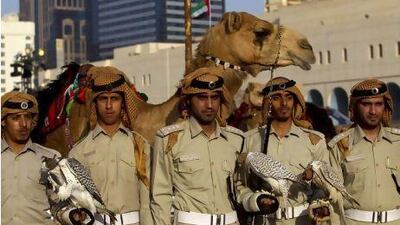ABU DHABI // Thousands of visitors flocked to the Qasr Al Hosn Festival for a walk through Abu Dhabi's history before the celebrations drew to a close at midnight yesterday.
They wandered the sandy compound to watch the historical exhibitions and live performances, checked out the traditional souq stalls, horses, camels, falcons and salukis, and met the Emirati craftspeople.
The 10-day festival, which began on February 28 and took place next the Qasr Al Hosn, the symbolic birthplace of Abu Dhabi, gave Emiratis, expatriates and tourists a chance to engage in Abu Dhabi's rich cultural past.
Sheikh Sultan bin Tahnoon, the chairman of the Abu Dhabi Tourism and Culture Authority; Sheikh Nahyan bin Mubarak, Minister of Higher Education and Scientific Research; and Sheikh Tahnoon bin Mohammed, the Ruler's Representative in the Eastern Region, were among yesterday's visitors.
By 6pm, there were 2,488 visitors, but the numbers surged an hour later to 3,859, according to organisers.
Over the past nine days, 23,288 attended. March 8 registered the highest number of visitors, with 7,296. These figures do not include attendees to the show, The Story of a Fort, Legacy of a Nation by Franco Dragone, which attracted at least 800 people a day.
"It reflects the importance to the nation's history in this iconic celebration of Qasr Al Hosn," Faisal Al Shaikh, the director of the festival, and director of the events bureau at Abu Dhabi Tourism and Culture Authority.
"The festival is becoming a national destination for traditional and cultural activities as the community came together to celebrate 250 years of Emirati history, culture and tradition."
Sandra Takac, 35, a housewife in Abu Dhabi who is originally from Serbia, said the festival was "nice and well-organised".
She was with husband Alen, 36, and their children Alexander, 5, and Alexandra, 3, at the desert area. They took photos of Alexander who enjoyed his camel ride.
"It's nice to learn about the UAE's history in this way," she said. "It brings us closer to Emirati culture and history."
It was the second visit for Shamma Al Khouri, 18, a student at Zayed University and resident of Abu Dhabi, and her family.
She came with her mother Aisha Darwish, 50, her sisters Mariam, 16, and Osha, 6, and brothers Diab, 9, and Mohammed, 5. They attended the festival the previous day.
"We came here to know more about how our people lived in the past," Shamma said. "We feel proud that people from other countries are here to know our culture, so it will be well-known in the world."
They were at the desert section of the festival, where Mohammed held one of the falcons. They took photos of the camels and stood next to Abu Dhabi police officers wearing their old brown uniforms.
"My grandfather used to work at Qasr Al Hosn," Shamma said. "Every Eid, my mother and other children would visit the fort and the sheikhs would give them 'Eidya' or gifts."
The fort is currently under restoration. Plans are under way to open it as a historical attraction.
Zeinab Al Tourq, a Lebanese housewife and an Abu Dhabi resident for 37 years, snapped a few photos of nephew Mohammed, who is Emirati.
"Today's the last day so we didn't want to miss the festival," she said. "We've been reading about in the newspaper."
Ms Al Tourq said the festival was a good opportunity for Mohammed to know more and understand his heritage, while watching Mohammed hold a falcon.
"His classmates have been talking about it and it's nice that he's here to experience the festival," she said.
A Takatof volunteer took Grant Olivier, 45, an aeronautic engineer from South Africa, and his family to a tour around the sandy compound. He was with his wife, Suzana, 50, and daughter Capria, 14.
"There's a wonderful mix of culture here," said Mrs Olivier. "Before coming here, I'd never heard of Abu Dhabi. We'd like to understand people's culture better and be able to integrate."

